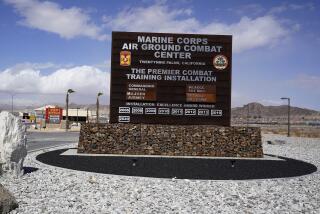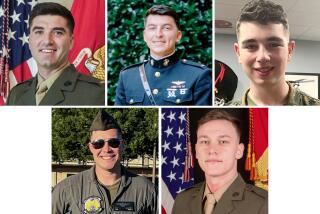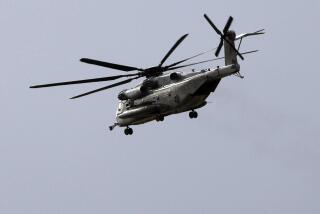Marine Outpost Key Player in Treatment of Wounded Soldiers
- Share via
WITH THE MARINES IN SOUTHERN AFGHANISTAN — Afghan opposition fighters injured when a B-52 bombing mission went awry stoically endured the pain as they were evacuated, U.S. military personnel said Thursday.
“No one ever looked angry; they were very accepting,” said Navy Dr. Steve Temerlin, who was aboard a CH-53 Super Stallion helicopter that carried to safety seven of the Afghans hurt in Wednesday’s “friendly fire” incident.
Five Afghans were killed and 20 were wounded in the bombing miscalculation, which occurred during a fierce battle between the Taliban and opposition forces north of Kandahar.
Three American soldiers were killed and 17 received moderate to severe injuries.
U.S. personnel said it was difficult to distinguish which warring side Afghan soldiers were on and that evacuation was complicated because the rescue helicopter crew was unsure whether it would be greeted with groundfire or gratitude.
“In this environment, everyone is wearing the black turban, and you don’t know if they’re an enemy until they shoot at you,” said Capt. David M. Steele, pilot of a Cobra helicopter that provided protection for the Super Stallion.
The evacuation, which allowed the Afghans to receive medical attention within minutes, showed the growing importance of the Marine outpost, dubbed Camp Rhino. Ten doctors staff a tent hospital. Some of the Americans and Afghans were flown to U.S. ships in the northern Arabian Sea after receiving emergency treatment.
Two of the three Americans killed were brought to a makeshift morgue here. One of the Afghans killed by a “smart bomb” from the B-52 may be buried at the outpost by the Marines as early as today.
Although few Marines have seen the anti-Taliban Afghan fighters, the Americans said they feel a sense of solidarity.
“It’s a fight,” Steele said. “We’re all in this together. I’d lay down my life for them and they would for us.”
A force of more than 1,300 is using Camp Rhino as a base for launching patrols to disrupt the movements and communications of Taliban and Al Qaeda forces and to prevent them from fleeing, possibly into Pakistan.
Most of the troops are from Camp Pendleton, but there are also U.S. Army personnel and a smattering of British and Australians.
The base, seized Nov. 26 in a predawn raid by helicopter-borne Marines, is a walled compound with a dozen buildings and gun towers at all four corners. Outside is an airstrip.
The Marines are using all the buildings except a mosque in the center of the dusty compound. In a sign of respect for the Muslim religion, the mosque has been put off-limits by the kind of tape often used at crime scenes.
The compound was assaulted by U.S. Army forces Oct. 20. When the Marines landed Nov. 26, they found the area abandoned.
It is unclear whether the Taliban planned to use the compound, which was never completed, as a military garrison, a distribution center for drugs--drug paraphernalia was found by the Marines--or, as some here suggest, a hunting lodge for the wealthy.
On Thursday night, the Marines fired two dozen mortar shells into the desert surrounding Camp Rhino after detecting credible information that the enemy might be probing the camp’s perimeter. Marines were ordered on alert, aircraft were launched, and light-armored vehicles raced into the desert. Some of the mortar rounds carried only illumination charges; others contained explosives.
This marked the first time since the Marines seized the compound that such measures were taken.
A Huey gunship crashed with four Marines aboard, possibly because of swirling dust, officials said. The ammunition aboard began exploding. One Marine was hurt slightly and the others were safe without injury, according to Capt. Stewart Upton, Marine Corps spokesman. The Huey burst into flames and smoke was visible over the compound.
Some of the Marines involved in the evacuation of the injured Afghans, who ranged from teenagers to men in their 60s, were also involved in destroying a downed Blackhawk helicopter weeks ago in Pakistan to keep it from falling into enemy hands. The Marines were peppered by sniper fire during that mission.
“Going into bad-guy country where people are trying to kill you makes your heart skip a little bit,” said Staff Sgt. Bryon Edgecombe, a crew chief.
More to Read
Sign up for Essential California
The most important California stories and recommendations in your inbox every morning.
You may occasionally receive promotional content from the Los Angeles Times.













